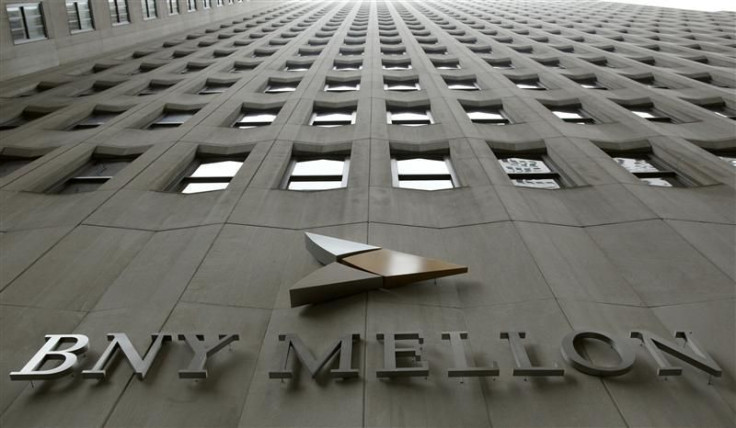BNY Mellon, Hybrid of the Finance World, Likely to Disappoint Wednesday

When the Bank of New York Mellon (NYSE:BK) reports its quarterly earnings Wednesday morning, the financial statement will be a reflection of an institution at several crossroads: the result of a a bank that is one thing while also trying to be something else. Tracing its roots to 1784, but trying to navigate the treacherous financial markets of 2012. Widely known for its dominance in the sleepy turf of trust banking, while also trying to muscle its way into the more aggressive corners of Wall Street trading. Smaller than some of its major competitors, but finding itself designated as one of the world's premier "too big to fail" banks.
Bank of New York Mellon is not a Main Street mainstay at the level of, say, Citigroup (NYSE:C), or Bank of America (NYSE:BAC). It does not have the level of name recognition that Goldman Sachs, for good or bad, enjoys. Instead, BNY Mellon is giant of the custody and trust banking sector -- an area of banking that deals with managing corporate treasuries and making sure fixed-income obligations are met. More recently, it has waded into other quadrants of finance that are more commonly associated with high-flying Wall Street broker-dealers.
"Of the three publicly-traded trust banks, STT [State Street Corporation] is the most pure play. Northern Trust is more of a hybrid -- custody, asset management and a private bank. Bank of New York Mellon is sort of exposed not just to pure custody and asset management, but also has more capital markets exposure," John Moran, a managing director at Macquarie Securities, told the International Business Times, naming State Street Corporation (NYSE:STT) and Northern Trust Corporation (NASDAQ:NRTS), two of the bank's competitors in trust banking.
"Negative for the Quarter"
Because BNY Mellon derives most of its revenue from trust banking, it has been negatively affected by a dim outlook for that sector, which performs at a reduced level in a lower interest-rate environment, and when trading volume is down.
While interest rates have been at historical lows for several years now, the drop-off in trading -- market data firm Dealogic estimates the dollar volume of global securities sales was down 26 percent the fourth quarter of 2011 -- is a more recent development.
"Generally, lower volume will be a negative for the quarter. That will be pervasive in their depositary receipt business," Brian Bedell, a managing director at the ISI Group, told IBTimes, referring to a specific area of trust banking that deals with holding assets for overseas companies.
"Clearly been a drag"
On top of the headwinds its main business line is experiencing, BNY Mellon faces some additional issues of its own provenance that could affect earnings in the quarter -- and for other periods to come.
The bank is currently exposed to major legal action related to the rates it offered clients who wished to engage in foreign exchange trading. Plaintiffs allege the bank consistently cleared foreign exchange transactions by offering costumers the worst possible daily rate on currency trades.
Those seeking court remedies have characterized that practice as outright fraud, although Macquarie's Moran notes, "it really strikes us as a contract dispute." Still, any settlement or further action is likely to weigh on the company.
"It's clearly been a drag," Moran said, "but ultimately we believe it will resolve itself."
Worst of both worlds
The question for BNY Mellon, given the reduced expectations for its main business line, is whether it can navigate ahead of its peer group, perhaps using its unique revenue structure to leverage some kind of advantage over competitors.
"Not in this quarter," ISI's Bedell said.
If that's the case, BNY shares, already battered for much of the past year, are likely to keep falling farther behind.
Shares of the bank, which suffered from the August market correction along with the wider banking industry, have not been as quick to bounce back as those of its competitors. Since the beginning of October, when the global equities market was at a nadir, the benchmark KBW Bank Index has risen 21.2 percent. State Street is up 32.9 percent. Northern Trust has ballooned 19.9 percent.
By comparison, shares of BNY Mellon are up an underwhelming 5.8 percent.
Indeed, BNY shareholders could fear that, as a result of its exposure to both the trust banking sector and capital markets, by being a jack of all trades (but master of none), the bank could end up with results that reflect the worst of both of those worlds.
Case in point: The bank is expected to take a hit sometime in 2012 due to new Federal Reserve of New York rules affecting the "repo" market, an area of securities dealing where the bank is a major presence, alongside JPMorgan Chase and Co. (NYSE:JPM).
No one knows exactly how bad the hit from that will be.
"It's tough to fully quantify the impact that that can have. People are still trying to figure that out," Moran said.
© Copyright IBTimes 2024. All rights reserved.





















